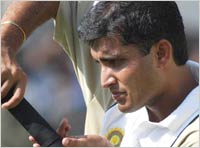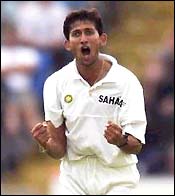Within minutes of the premature end of the Basin Reserve Test, a mail from a long-time Rediff reader landed in my box here. 'I find it strange,' he says, 'that after six years of constantly covering Indian cricket you are suddenly silent. I've even read your match reports of a series involving India, Kenya and Bangladesh - so what happened to you? Nothing left to say, or have you given up on the team and moved on to other things?'
24 hours later, there are quite a few more mails in the box -- some despairing, some damning, many resigned, some outright abusive (Why is it that these days, when anything at all happens -- from riots in Gujarat to a wipeout in Wellington -- it is the media that cops the blame? We'll leave that for another day).
To answer those questions: Yes, I have nothing left to say; no, I have not given up on the team; yes and no, I have moved to other assignments that have left me with less time to watch cricket than I used to have.
Assignment or no, I did sit up, well past midnight here in New York City, watching the three days this Test lasted. And I did think of writing - even made a start at it, too. But as the words formed on the computer screen, I had this strange feeling that I was writing it from memory. So I went back to Rediff and did a search among the articles, columns and match reports of past tours -- and guess what? I WAS writing from memory, words that had been said in the identical context, before.
The sheer enormity of the defeat was for me summed up in one little fact -- and a related incident. The fact is this: Daniel Vettori, rated the best left-arm spinner in the world and, before this Test began, level with Harbhajan Singh on 139 wickets, did not bowl a single ball in anger against the Indians.
Before this series began, any analyst worth the while would have identified Vettori and Shane Bond as the lead bowlers for the Kiwis. One of two lead bowlers just was not needed, by the home side, in wrapping up a ten wicket victory (and let us not even think of one mister Chris Cairns).
The related incident I mentioned relates to a throwaway line I saw in a media report: To wit, that within minutes of the winning runs being scored, one Daniel Vettori was back out on the ground, practicing, accompanied by Craig McMillan, the only Kiwi batsman in the top five who failed to make a double digit score. I wish, don't you, that someone had been able to report that shortly after their defeat, the Indian team was back out on the ground, practicing their bowling, batting, and fielding?
Discount all you have heard about the Indian batting lineup being the most powerful in the world today -- that comment stems from an illusion familiar to those who make those moving picture books. Ever tried out one of those, the kind where you use your thumb to flip the pages rapidly, and it seems to you that the pictures are actually moving? Same illusion, different context - these days, Tests and ODIs follow one another at such dizzying speed, that after a while, we tend to see it all as a blur. Ergo, the batting lineup that chased 300+ totals thrice inside a little over two months, and came within a rain cloud of winning the ICC Champions' Trophy, is presumed capable of duplicating those feats in the Test arena.
It cannot.
It is perhaps laudable that this team has won three Tests abroad in a year, unlike its avatars in the past. But it is still a long way from being able to win a Test series away from home, because it has yet to master the basics of playing abroad. It is tempting, at this point, to statistically delineate those basics - to explain, to elaborate. (In passing, a word for Navjot Singh Sidhu, that modern master of the mangled metaphor: The next time he wants to use that old chestnut about statistics, drunks, and lamp-posts, he should wave a flag or something, so we can all reach for our barf bags).
 But it is when you begin doing it, that deju vu sets in, big time. Check this article out. And when you are done, think of this: This was written in 1999, and India lost the first Test of that series by 285 runs (that is, approximately a 10-wicket win). If you want to delve further, here is an eerie parallel: in that Adelaide Test, the Indian second innings produced 110 runs in 38.1 overs; here, at the Basin Reserve, it produced 121 runs in, surprise, exactly 38.1 overs.
But it is when you begin doing it, that deju vu sets in, big time. Check this article out. And when you are done, think of this: This was written in 1999, and India lost the first Test of that series by 285 runs (that is, approximately a 10-wicket win). If you want to delve further, here is an eerie parallel: in that Adelaide Test, the Indian second innings produced 110 runs in 38.1 overs; here, at the Basin Reserve, it produced 121 runs in, surprise, exactly 38.1 overs.
The trouble with this team, then and now, has been that it does not have the desire, nor the will, to stand out there and fight. Faisal Shariff said it best, in his final day match report - when the demons are in the mind, what difference does it make if it is a green top or a brown wicket?
That is why, though it is tempting to talk of Laxman's leaden-footedness or Sourav's shivers or whatever, there is no point in doing so, really. Some of the ills ailing individual batsmen and bowlers can be cured. Others, breathing the air of Test cricket entirely thanks to life support systems (read, selectors) can be jettisoned. But to what end?
Take - and this is only one example - a certain Ajit Agarkar. Over the last couple of years, his career runs thus: picked, bowls badly, gets dropped, gets picked, bowls badly, gets dropped, gets picked, bowls ba.
 In seaming conditions in England, he was dropped because he bowled badly, right? And not even considered good enough to be included in the home series against the West Indies? So by what logic does he get back in as a frontline seamer here?
In seaming conditions in England, he was dropped because he bowled badly, right? And not even considered good enough to be included in the home series against the West Indies? So by what logic does he get back in as a frontline seamer here?
What this reminds you of is watching a bad card player - you know, the kind of guy who gathers up his cards, fans them out, shakes his head, tries arranging them this way and that, drops one, picks another, shakes his head, wonders if he should have retained the first one.
Shuffle till your fingers develop calluses, a bad hand is a bad hand should be jettisoned - and someone needs to tell our selectors that. (In passing, the latest poll on the Rediff cricket site, I notice, asks the question: Should changes be made for the second Test. 67 percent say yes.)
There really is only one way to select a team: examine each player's credentials, see if he has what it takes to fulfill the duties attached to his particular position and if the answer is anything less than an unhesitating `yes', then drop him.
The Aussies are brilliant exemplars of this - look at the pragmatism underlying the dropping of first Mark Waugh, then Steve Waugh. The former could legitimately claim that he is a great batsman going through a lean patch; the latter could with even more legitimacy claim that he fashioned this outfit into world beaters, that they are still sweeping aside all comers under his leadership, and therefore he deserves to stay. But no, the selectors - and it pays to remember that a player of the stature of Allan Border heads them - ask themselves just one question, is this bloke the best we have for this particular slot? If the answer is no, then sentiment follows statistics out the window.
In India, we worship personalities. Down Under, they worship results. Fair enough, then - we have superstars, they have superb results.
The point is, we need an attitudinal change to the way we approach our Test cricket - a revision from the bottom up, a rethink of the pitches we prepare, the players we pick, the way we prepare for a series, the way we play.
The theme of this piece is déjà vu, so here is some more. Stephen Fleming at the end of the Wellington was all praise for the pitch, and said he had been asking for pitches with more bounce for some time.
"All I ask for in New Zealand is bounce," said Fleming. "They make us better with the bat and ball and this wicket, and hopefully a similar one in Hamilton, is heading in the right direction."
Big deal. We ask for better pitches, too - all the time. Check this article out, if you don't believe me.
This was written in January 2000. Two years later, it is status quo ante - the same featherbeds at home, the same humiliating defeats abroad. And we wonder if dropping X and bringing in Y is the answer.
We will conceivably do better in the second Test - in any case, it is hard to imagine how we could do any worse. And if we do, the memory of this debacle will be wiped out - more so, because seven one day internationals follow and in these, you won't find medium pacers like Oram and Styris bowling with 5 slips and a gully.
In his day one match report, Faisal when talking of the Indian debacle said we could take an old match report, simply substitute the names of the opponents, and put it up as a fresh one and no one would know the difference.
That was no figure of speech.
In his post-match comments, Ganguly said: "Our batsmen have scored runs all over the world in different conditions. It was just one bad game, one bad Test for most of them."
Here is a match report, from just over a year ago - November 2001, to be precise.
Ain't amnesia wonderful?!







 © 2025
© 2025